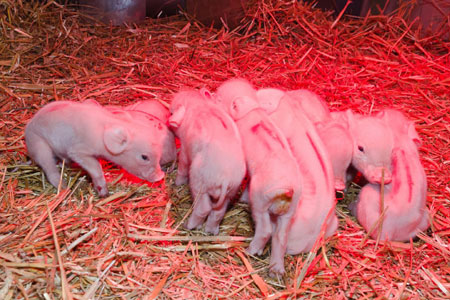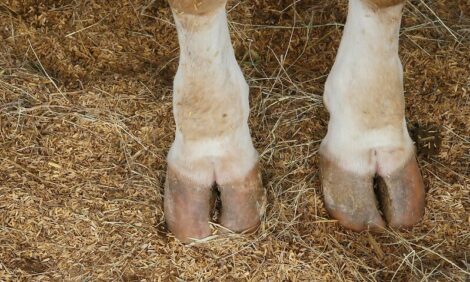



Drug Resistance in Intestinal Parasite of Piglets Confirmed for First Time
AUSTRIA - The parasite Cystoisospora suis causes diarrhea in pigs, especially in newborn piglets, and is capable of quickly spreading across farms.For this reason, pig farmers in Europe preventively use toltrazuril to control parasite development. In contrast to congeneric parasites in chicken, no resistance to this pharmaceutical compound was described in pig parasites until recently.
In an article in Parasites & Vectors, researchers of the University of Veterinary Medicine, Vienna, have now for the first time confirmed that toltrazuril is ineffective against a Dutch isolate of the parasite.

Even though antiparasitic resistance in pig parasites is developing slowly, monitoring of resistance should be intensified due to the lack of alternative treatment options, and increased hygiene measures should be taken to prevent pathogen spread.
When newborn piglets suffer from diarrhea, this is frequently caused by the intestinal parasite Cystoisospora suis. The pathogen may spread rapidly on affected farms, causing a high rate of disease among livestock.
Infections are rarely fatal, but they hamper the growth of suckling piglets and thus reduce body weight compared to healthy individuals. The course of infection varies from one piglet to another, leading to uneven weight development which consequently can induce significant economic losses for the affected farm.
When pathogenic bacteria infect the intestines damaged by the parasite, the piglets are susceptible to serious diseases, which can lead to the loss of entire litters.
In Europe a standard treatment regimen with toltrazuril has been used to control the parasite for about two decades now. In contrast to congeneric parasites in chicken, against which toltrazuril is no longer consistently effective, resistance to this pharmaceutical was not known in pigs until recently.
It was only in 2014 that a Dutch producer reported an increased rate of diarrhea in newborn piglets despite treatment. Using isolates from this farm, researchers at the Institute of Parasitology were able to prove for the first time that the parasites in question were resistant to toltrazuril.
Diarrhea manifests despite double dose of toltrazuril
Based on the information from the Dutch swine farmer, samples of this strain of parasites - so-called isolates - were compared to an isolate from Vienna on which toltrazuril has the desired effect.
"Prior to this, we ruled out the possibility that bacteria or viruses could have caused the diarrhea. By this, we could demonstrate that the parasite was very likely the cause of the disease," says Head Researcher Anja Joachim.
To confirm the resistance, the research team administered various doses of toltrazuril, starting at the prescribed dose of 20 mg/kg of body weight.
All piglets infected with the Dutch isolate developed diarrhea on the fourth day after infection - regardless of the dose of the medication.
"Even treatment with the double dose had no effect on these isolates," notes Professor Joachim.
Apart from symptoms such as diarrhea, the presence of developmental stages of the parasite is a clear indication of its presence.
"Toltrazuril is effective if no oocysts - the final developmental stage of the parasite - are present in fecal samples," say lead authors Aruna Shrestha and Barbara Freudenschuss.
Final development stage of the parasite found in feces confirms its drug resistance
When the parasite keeps developing in the intestine, it forms oocysts which are excreted via the feces. In this way, the pathogen is spread within the litter and the existing livestock, as oocysts are highly infectious and have a very strong tenacity in the environment.
If toltrazuril takes effect, no oocysts are present in the feces; the life cycle of the parasite is disrupted, preventing it from spreading. By contrast, the parasite isolated in the Netherlands was detected in all fecal samples, despite treatment.
"This is how we conclusively showed that toltrazuril had no effect on this parasite isolate. This makes it the first strain of Cystoisospora suis with confirmed resistance to toltrazuril," assert the authors.
As part of the standard treatment regimen, there has been no regular testing for reduced efficacy of the drug resulting from possible resistance.
"Until recently, there had only been some suspicion based on reports from the field. However, we were worried because resistant strains in chickens were constantly developing. The strain from the Dutch pig stock confirmed our suspicion. Resistance of Cystoisospora suis seems to be developing slowly, but it is expected to become more frequent," explains Professor Joachim.
Resistance to toltrazuril on pig farms could become a problem as there is no practical alternative control measure available. Once resistant parasites appear in a farm, there is no way of eliminating them permanently.
Improved hygiene standards and disinfection are currently the only immediate alternative
The researchers advise veterinarians to increase testing for diarrhea and oocysts, regardless of preventive treatment.
"These routine checks can be performed easily. When oocysts are discovered in the feces despite the administration of toltrazuril, additional measures should be taken immediately," warns Professor Joachim.
Improved hygiene measures and chemical disinfection in particular can keep down the number of oocysts in the environment of the piglets.
This is an essential prerequisite for preventing resistant parasites from spreading. As a consequence, it will be essential to consistently monitor the success of treatment in order to detect any developing resistance of the parasite.







